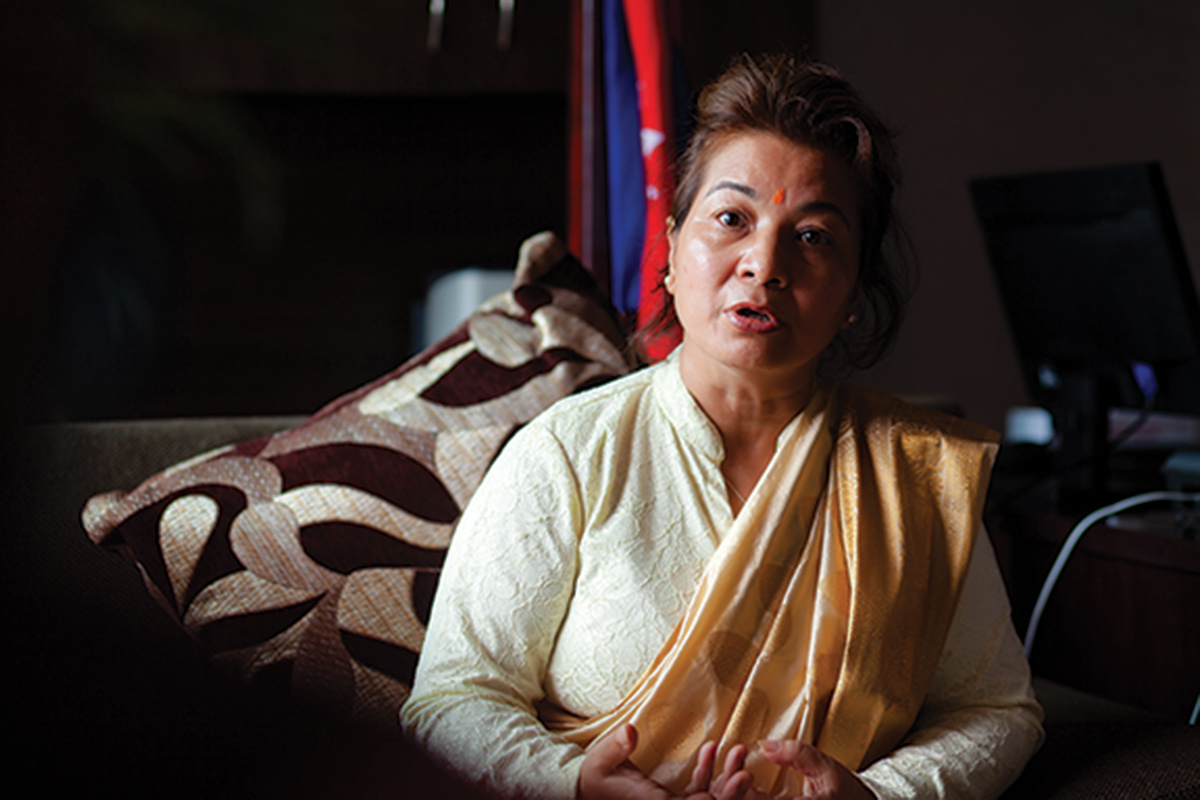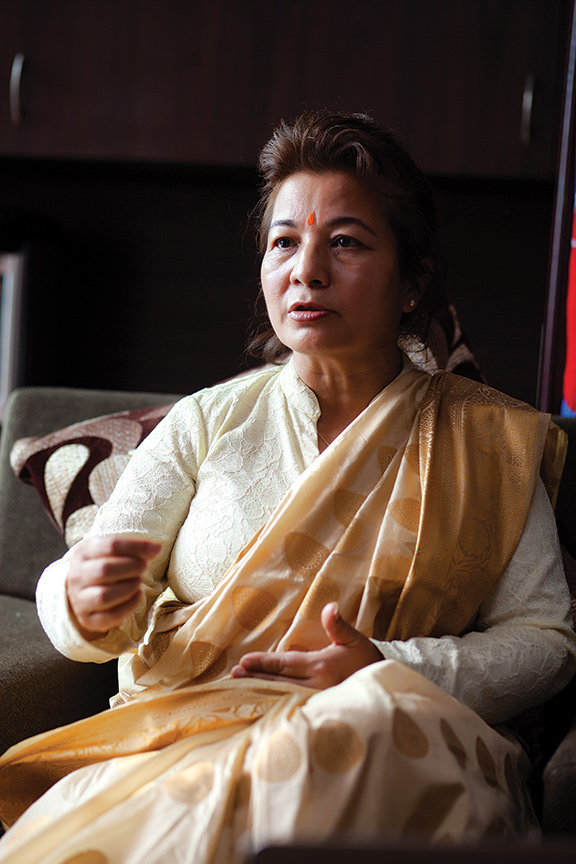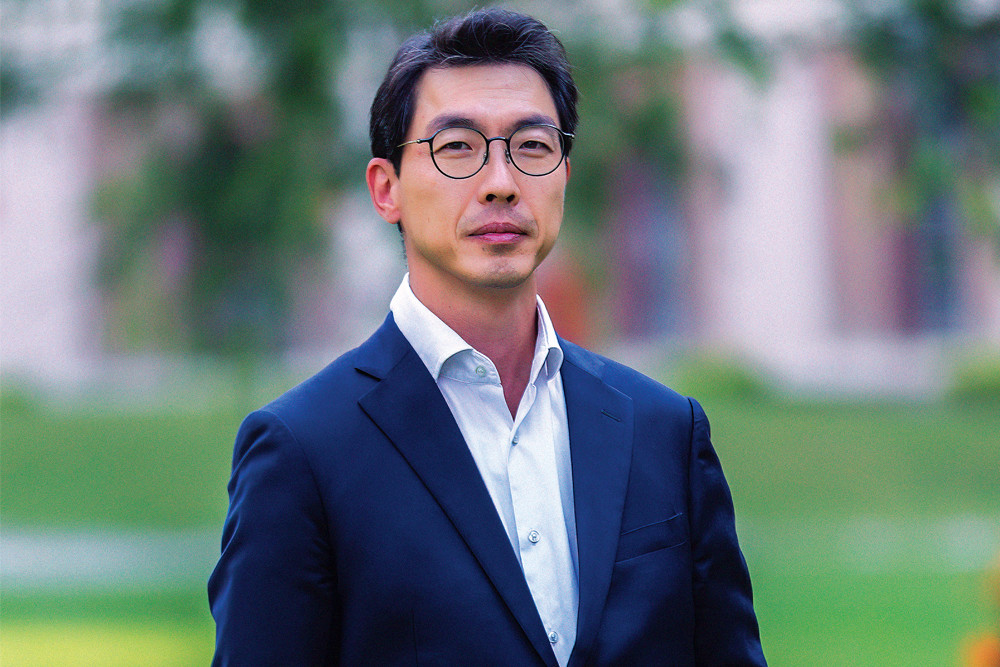
Dr. Sumitra Shrestha Amatya is an architectural engineer, academician, planner and administrator. She is serving as the Commissioner of the CIAA (Commission for the Investigation of Abuse of Authority), Nepal’s constitutional antigraft body, since her recent appointment some months ago. She is first woman Ph.D. holder in the field of architecture which she accomplished from Moscow Institute of Architecture, Russia in 2001.
As a Commissioner of CIAA, she is assigned to look into the physical infrastructure sector to ensure governance and quality during the execution of infrastructure projects.
Amatya had previously served as member of the National Planning Commission in 2015-16. She played a key role in managing disaster waste during the 2015 earthquake and has prepared the Disaster Waste Management Policy & Strategy for the Government of Nepal.
Business 360 caught up with Dr. Sumitra Shrestha Amatya to learn how CIAA has been working to ensure good governance, smooth and quality service/infrastructure delivery from the government through controlling red tapes. Excerpts:

What was your response to be appointed Commissioner of the CIAA?
I was informed by the media that the Cabinet has nominated me as Commissioner of CIAA. It came as a surprise to me as it was a completely new sector for me. I had served as an academician, planner, administrator in the past and I think the government had nominated my name on the basis of my diverse experience background. Normally the commissioners appointed come here after a long career as bureaucrat, police, legal practitioner and other sectors assigned to keep good governance. I am gradually adapting to the work culture and functions of the CIAA. I came from a technical background and I do rely only on truths and facts. The main motto of CIAA is to control corruption and ensure good governance. Towards this I believe that teamwork is essential to deliver results and we have a wonderfully experienced team here. People have high expectations from CIAA and we are determined to deliver.Which sector do you look after at the CIAA?
I look after the infrastructure sector. However, we do discuss findings in the team and actions are taken based on collective decisions. While talking about the anti-corruption architecture, we look into the jurisdictions and assess our capacity while probing cases. We also have limitations. We have to be better equipped with required legal infrastructure, investigation capacity, human resource and requisite equipment. What I have experienced in this short period is that the engineers are not only being charged due to their ill-intention, some of the engineers fall into the radar of CIAA even though they are innocent. But ‘ignorance of the law is no excuse’ which is why I would like to suggest that they strictly abide with the prevalent laws. CIAA also works to aware, to enhance the prestige of the government institutions, and to perform as per the given conditions.How would you like to explain the role of CIAA as an anti-graft body in the current situation? Do you think the CIAA has been able to control the corruption in the public sector?
CIAA can do a lot to keep governance in the right track because corruption makes the country hollow and common people have to suffer a lot. Corruption has a huge socio-economic cost. I am assigned particularly to look into the infrastructure sector where large chunks of the country’s resources are mobilised and this sector is considered the major sector where corruption is rampant. Recently, I had visited the regional office of CIAA and I had a brief interaction with engineers. I have asked them to ensure that infrastructure is built properly with use of quality construction materials, approved structures and design and other engineering works. If an engineer compromises on quality control, it could create multiple impact on our economy and not just misuse of resources. For example, if a school building that is built compromising on standards collapses due to minor natural hazard, there could be a the huge loss of lives of school children. It could be a criminal offense. We cannot grant excuse to anyone who does not accomplish their job properly. I am easily accessible to anyone who wants to contribute to the country with moral objectives. When an innocent person is alleged due to different circumstances, we also work to help them prove themselves innocent. We’ve found many cases of suicide by engineers who fell into the trap because of unintentional mistakes. There is a saying that ‘let hundred guilty be acquitted but one innocent should not be convicted’, and we take this into serious consideration while probing and filing cases in court. At the same time, we prepare strongly against those with ill and fraudulent intentions.In Nepal, government-run development projects are considered to be the largest source of corruption. There are allegations of substandard works, cost and time overrun, variation, lack of monitoring, nexus in awarding bids among others. What is your perspective in controlling these?
The problem with government contract begins with the lowest bidding. We have framed a procurement law to control misconduct envisioning that everyone in authority and contractors are not trustworthy, but we have not envisioned promoting genuine authorities and credible contractors. We have provision for the lowest bid. Apart from donor-funded projects, we still adopt lowest bidding that is the main reason behind delay, delivery of substandard works, and variation. The government started picking double envelope bidding— technical and financial— for donor-funded projects. If the bidder is sound technically, then they start evaluating financial proposals, this is one of the solutions to avoid lowest bidding. We should have strong monitoring mechanism from the government side to ensure the quality of infrastructure. CIAA has been mulling over sting operations in construction phase to control such irregularities.Are contractors executing government projects under the radar of CIAA?
Absolutely, they are because the projects are executed from the taxpayer money. Along with contractors, project offices, decision makers and concerned agencies are under the radar of CIAA. We track the taxpayer money to ensure that it is spent without corruption and embezzlement of resources. Corruption creates inequalities, increases poverty, impacts achieving our goals. Illicit money can be used to gain power, influence or terrorise people. That’s why the society must unite against corruption. All sensible citizens, media, legal practitioners or anyone can inform CIAA regarding corruption even without mentioning their name.How can prevalent malpractices on public service delivery be controlled?
Corruption distresses the society, even service receivers think that they can get easy and fast service if they bribe the service provider in government agencies. They should not do it. Bribing someone is also illegal equal to those who don’t deliver services demanding for bribe. Service takers should also be aware. We have conducted massive sting operations and also mobilised intelligence teams at foreign employment, land registration, tax, vehicle registration/renewal offices to control such ill practices. We encourage them to adopt new technologies for effective and efficient service delivery. Gradually, the government should encourage them to go digital and promote digital payments. We suggest that if the service provider and service receiver do not meet each-other (through use of digital means), it will lower the chances of corruption. Our intelligence is mobilised in civil dress as consumers of services or we take action after probing the grievances we have received from the public. We have a hotline number 107 and we receive and investigate all the grievances. We do work with District Administrative Offices in every district. If we are unable to reach a place immediately, the Chief District Officer mobilises a team for prompt action on behalf of CIAA. Anyone can inform CIAA regarding irregularities keeping their identity secret, we do not seek identity considering the security perspective. I think we should have laws to provide security to people who give information with evidences, this will be a substantive move to promote anti-corruption.
There is widespread criticism of CIAA that it is focused on small cases of corruption rather than the rampant corruption on large scale…
We do investigation on policy level decisions as well; we investigate intention of the decisions and who are the beneficiaries of that decision. We don’t spare anyone whether they are small or big, even the Commissioners of CIAA are probed. CIAA should be equipped to investigate policy level decisions that could have long term impact and there should be political will and bureaucratic commitment to control corruption. We need a bigger force to fight against the big players.In recent years, CIAA is being blamed for favouring the government. It has been showing political colour rather than acting as a constitutional body to control corruption and ensure good governance?
That is wrong practice and that should not happen. That’s why we are making everything transparent and disclose information to the general public. Apart from information that could impact investigation, we disclose all possible information to the public to create public pressure. Political people must work for the wellbeing of the people, frame policies and laws. They should not try to influence or seek favours breaching the law or seeking favoritism and nepotism. If they do so, they will be exposed in front of public and lose their credibility. Politicians must support keeping the society clean and ensure social justice through control of corruption. If we read the manifestos of political parties, all of them stand against corruption; every government announces that they will adopt zero tolerance against corruption. Such announcement must be reflected in practice to ensure their credibility.Top level bureaucrats and even ministers sometimes withhold important decisions fearing CIAA. While we can see the impacts of decision making, why can’t the CIAA establish that delay in making timely decisions is also an abuse of authority?
That is an attempt to pelt their inefficiencies. We have also heard in the bureaucratic circle that ‘not taking decision is a good decision’. CIAA needs to be proactive to make decisions happen. Even if the CIAA begins probe in some cases, they don’t need to halt the work. They can continue their work and they should not be scared if they are not guilty and are functioning within the parameters of prevailing laws. CIAA cannot allege without evidence. We have facilitated many cases to continue their work even during the probe period.How can CIAA be better equipped for effective investigation?
Corruption control architecture must be equipped with legal, technological infrastructure and talent (human resources). We should have equipment for police, well-equipped labs and confident and highly trained intelligence among other machineries. We can collaborate with antigraft agencies for knowledge sharing and strengthen our system. We look forward to receiving support from lawmakers to frame laws that support our work. Another challenge we face is that civil servants are reluctant to work in CIAA for a longer period, they seek transfers.CIAA is also looking to expand its jurisdiction to probe private sector corruption while it already has limitations in investigating public sector corruption. Your thoughts.
Our jurisdiction confines us only to the public sector. However, there is huge corruption in the private sector where even taxes are not being filed properly. Quality control of goods and services must be ensured because people are paying a price for it and the private sector must practice ethical business. As per international commitment, we should investigate private sector corruption under our jurisdiction. We have sent the draft bill; if the parliament endorses it then we will be able to execute it. I think the private sector does not need to be terrorized by this law, those who work ethically and transparently have nothing to fear from the CIAA.”
Published Date: July 26, 2021, 12:00 am
Post Comment
E-Magazine
RELATED Face 2 Face



.jpg)
.jpg)
.jpg)